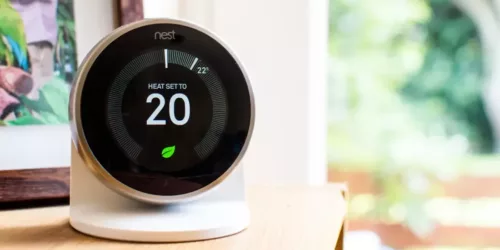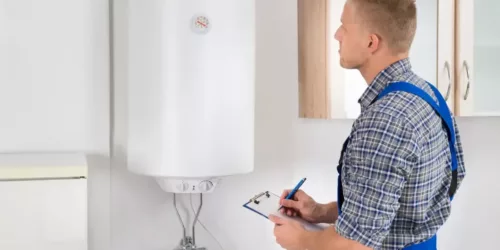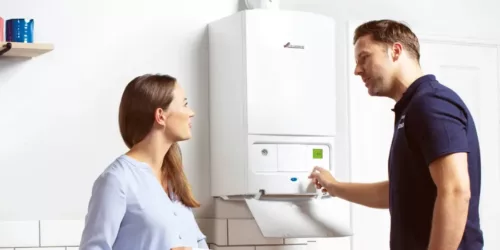What Is the Cheapest Way to Heat Your Home?
Get Help With Your Heating Costs by Seeing What Works Best
- Get help with your heating costs by choosing the cheapest system
- Environmental impact and heating costs in the UK
- Get cheaper heating with the Boiler Upgrade Scheme
There are many different ways to heat your home, but one thing to consider is what the cheapest method is. In order to help with heating costs, it’s important to see how you can reduce how much you spend.
For the sake of analysis, we’ll take a look at three tiers of affordability: operational costs, environmental costs and installation costs. Each heating method comes with its own drawbacks, and money is always a factor when you need help with heating costs.

What's On This Page?
Click the links below and head straight to a specific section of the article.
Heating Systems Compared
We have compared nine different heating systems to give a more rounded overview to help with heating costs. These include the use of more sustainable heating methods, like solar thermal energy and infrared panels, as well as more traditional methods, like oil boilers and liquid petroleum gas (LPG).
It’s also worth noting that some of these systems can only heat your home and not your hot water, so all costs have been adjusted to compensate for the hot water cylinder and/or additional boiler that would be required. These include solar thermal, infrared panels, air source heat pumps and ground source heat pumps.
What Is the Cheapest Operationally?
To help with heating costs, it’s important to consider how much the heating system will set you back year after year as it’s not just the initial purchasing and installation fee that will affect you. Here’s how our nine heating systems ranked.
Solar Thermal
Biomass
Infrared Panels
ASHP
Oil Boiler
GSHP
LPG
Gas Boiler
Electric Boiler
In terms of running costs throughout the year, solar thermal comes out on top. That’s because this system is essentially able to provide 50% of your yearly heating for free over the warmer months. Free heating can help with heating costs considerably. The operational costs linked with this system come from the boiler and hot water cylinder attached to it, which will be required during the winter months.
Biomass boilers need to be refuelled regularly with wood chips, pellets or logs, depending on the boiler. These can be sourced relatively cheaply compared to other fuelling costs, as wood is fairly sustainable to collect, which can lower heating costs compared to other methods.
Need help with your heating costs? Read here for the best boilers in the UK and see how they rank.
Infrared panels heat objects rather than the air in the room, which means they’re able to run more efficiently compared to other means. This can help with heating costs as they’re still fairly cheap. A single panel operating for 2 hours a day will cost £124 per year to run. Naturally, you would have more than one panel in your home, so this cost increases the larger your home is and the more panels you have.
Air source and ground source heat pumps come in different sizes, but the operating costs are associated with their use of electricity. With electricity becoming more expensive, it ups the running costs. They rely heavily on a well insulated house to help with heating costs by keeping operational costs low.
An oil boiler can hold enough fuel to heat a house for up to nine months and the costs associated with this system are largely in relation to purchasing the fuel, which is the same for LPG, but the system also needs a hot water cylinder. With our trend to lean towards sustainable means, this has done nothing to help with the heating costs of oil and LPG as they’re no longer as popular.
Read here for boiler service costs.
Gas is cheaper than electricity, which is why gas boilers rank slightly higher, but these are dependent on supply costs. Gas boilers also need annual maintenance from a Gas Safe registered installer, which doesn’t help with heating costs. Once the gas boiler ban comes into effect, electric boilers should become much cheaper to buy, but the use of sustainable electricity generation should lower heating costs.
You can see how the systems compare in the interactive graph below.
What Is the Cheapest Environmentally?
If we consider the environmental impact and how eco-friendly these heating systems are, we are presented with a different cost entirely. In order to help with heating costs associated with the environment, we’ve measured the amount of CO₂ equivalent per kilowatt hour in grams to give an indication of how kind to the planet these systems are. Here’s how they ranked.
GSHP
ASHP
Solar Thermal
Infrared Panels
Gas Boiler
Biomass
Electric Boiler
LPG
Oil Boiler
If you need help with heating costs, ground and air source heat pumps are cheaper to operate than gas and electric boilers and have the lowest carbon emissions as they rely on natural heat, for the most part, to operate. The only emissions generated come from their use of electricity. If a green energy provider is used, you should technically be able to remove the emissions entirely.
See our guide to learn the cost of a new boiler and how an efficient boiler can help with your heating costs.
Likewise, with solar thermal and infrared panels, you can lower heating costs as they are more energy efficient. Solar power is renewable and offers free heating throughout the summer months, generating no emissions, but the use of the boiler in the winter months expels greenhouse gases. The boiler also counts towards emissions for infrared panels, but because they use electricity to operate, they’re not renewable. These means are both cheaper to operate than traditional boilers and help with heating costs associated with the environment too.
Gas and electricity are closely linked as they are largely generated using unsustainable means. While there has been a shift to use renewables in more recent decades, there is still room for improvement, which will reduce emissions and help with heating costs further. Electricity will get higher in the rankings after the gas boiler ban and we start to rely more on renewable energy generation.
Biomass is an object of contention for some because it burns trees, which expels more gases, which the trees themselves captured in the first place. Not only this, but you have to take into account transportation costs, as well as how the home fuel was manufactured in the first place. They aren’t carbon neutral and recent studies have suggested they give off more carbon than burning coal. If you’re considering any help with heating costs, environmentalists would encourage other means of home heating.
LPG and oil are the least environmentally sound, as they are burning fossil fuels. You can’t get around this fact. While some companies are looking at using more sustainable versions of LPG, the UK’s net zero goal will make LPG obsolete in the next decade or so. The same thing will happen to oil boilers. In terms of the environment, you can help with heating costs by choosing an alternative heating system.
You can see how they compare in the interactive graph below.
What Is the Cheapest to Install?
Now that we know about the other costs associated with these heating systems, how much do they cost to install? While the other costs are useful to know, the biggest help with heating costs is how much it will set you back straight away. Prices vary considerably, but here’s how our systems ranked.
Electric Boiler
Gas Boiler
Oil Boiler
LPG
Infrared Panels
Solar Thermal
ASHP
Biomass
GSHP
Electric boilers take the lead, quickly followed by gas. While mains gas may be cheaper to run than electricity, electric boilers have fewer parts and require no flue, which makes them cheaper to install. The best help with heating costs you can get is to go for our cheapest ranked system. For more information on what their differences are, read our Electric vs Gas boilers blog.
Oil and LPG boilers are slowly being phased out, but they remain cheaper to install than most other forms of heating system. LPG can take up plenty of room, especially if it’s an underground storage tank, which will raise this price even more. This will not help with your heating costs.
While infrared panels come in next, it starts to raise questions about the affordability of going green. With solar thermal and air source and ground source heat pumps being expensive to install, it puts renewable energy outside the reach of those without the initial funds. The good news, though, is that you can get grants to help with heating costs associated with buying these.
Biomass boilers come with a hefty price tag, especially if you opt for a self-feeding mechanism. Smaller, manual systems won’t cost as much but bigger houses will require bigger systems to cover all your heating needs. Lower heating costs can be found with other heating systems, but you can get help with heating costs through the Boiler Upgrade Scheme, which can knock off £5,000 from the cost of a biomass boiler.
Finally, ground source heat pumps can cost in excess of £25,000 to install. Not only this, but they require garden space and massive holes to be dug. If you find you need help with heating costs, this price is enough to put most people off. However, the payback period is difficult to predict, but can be less than a decade, depending on how well insulated your home is and how efficiently the heat pump is used.
You can see how these systems compare in the interactive graph below.
Green Incentives to Help With Heating Costs
While the more sustainable heating systems do come with a bit of a premium price tag, there are government incentives to help against the purchase and installation to help towards heating costs.
The Boiler Upgrade Scheme (BUS) is an encouragement to install low carbon systems in homes to help with heating costs. You can receive:
£7,500 discount off an air source heat pump
£5,000 discount off a biomass boiler
£7,500 discount off a ground source heat pump
When the gas boiler ban comes into effect and other types of boiler start to become obsolete, the availability of sustainable systems will increase, which will make them more affordable. There are currently free boiler schemes to help through British Gas providing grants.
If you’re able to cover the price tag of these systems, you’ll benefit from low operational and low environmental costs. Otherwise, to help with heating costs, you’re better off going for an electric boiler. The price of electricity fluctuates, but there are means to reduce this through installing your own renewable sources, like solar panels. You can also help towards heating costs by changing to a green energy supplier.
Table Summary
Data sourced from Energy Saving Trust and ICAX
Related articles
View all Boiler articles
Top Tips When Buying a New Combi Boiler

Save on Heating by Keeping Your Boiler at 60°C

Smart Boiler Installation: All You Need to Know

Smart Thermostat Guide: All You Need to Know

Boiler Systems: All You Need to Know About Domestic Boilers

What Size Boiler Do I Need for My Home?

The Complete Guide to Worcester Bosch Boilers







